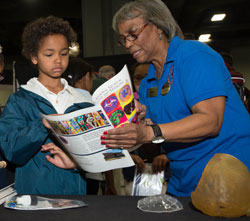Volunteer Docent Uses Opportunity to Continue Learning
By: Shannon Sarino, National Museum of Health and Medicine
Andrea Rander uses her volunteer experience as an opportunity to continue to learn.
"I am enthralled by the history that comprises the museum," she said. "I feel as though I never read in elementary or junior high school anything about the Civil War. So, I am still in the process of learning and reviewing that subject. I also am impressed by the contents of the museum and the history of how artifacts have been discovered and/or received."
A volunteer since late 2008, Rander originally responded to a listing of volunteer opportunities in a local newspaper. Although she originally came to NMHM to fill a need for a greeter, she instead became a volunteer docent, and said she enjoys giving tours.
"Andrea is such an energetic and enthusiastic member of the volunteer team," said Gwen Nelmes, NMHM tour program coordinator. "She comes to every event with a smile on her face and wealth of knowledge and experiences. She makes the museum a welcoming place of all groups."
Volunteer docents provide education and interpretive support for NMHM's programming. Docents support tours, outreach and family programs. Through NMHM's educational programs, the museum inspires and promotes interest in the understanding of medicine—past, present and future—with a special emphasis on American military medicine. With a vast collection of more than 25 million objects and a diversity of visitors, volunteers at NMHM are provided with a unique and rewarding experience.
Rander is a retiree, having worked in social work for the National Institutes of Health for 19 years. She was the director of the language interpreters program and volunteers. A military spouse whose husband served in the Army for 23 years, she also volunteers with the Red Cross.
"It is sort of a continuance of my Red Cross experiences when I was overseas in Germany. Each week for a day, I volunteer at Walter Reed National Military Medical Center in the physical therapy department," she said. "My role as a volunteer is to assist the staff with exercise equipment, supplying water to any of the patients who are wounded warriors, assisting with change of the sheets, towels, pillows on each of the exercise beds. We are trained to recognize the special items that are needed for use in rehabilitation and how they are used."
Rander said she finds many specimens and artifacts at NMHM fascinating, making it difficult to highlight one favorite.
"Sometimes, it changes depending on any questions that are directed to me. In other words, I'll feel that an explanation makes me more aware of whatever the answer is. For example: the brain stem. It still amazes me. Then, if I'm asked about facial reconstruction, I'm fascinated again because I realize how it connects to so much of the plastic surgery concepts of today's surgeons," she said. "Then, of course, in a prideful way, I enjoy pointing out the 54th Regiment which included African American soldiers who fought in the Civil War. Many visitors have no idea, unless the movie 'Glory' is discussed."
If you are interested in military medicine, history, medical science and have a general love of museums, join NMHM as a volunteer docent! Candidates must be at least 21 years of age and have a flexible schedule.
 |
Caption: Volunteer docent Andrea Rander talks to a visitor at the National Museum of Health and Medicine's booth at the USA Science & Engineering Festival, held April 26-27, 2014 at the Walter E. Washington Convention Center in Washington, D.C.
(Disclosure: This image has been cropped to emphasize the subject.) (National Museum of Health and Medicine photo by Matthew Breitbart / Released) |



